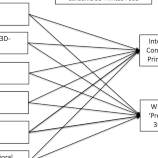
Articles
-
Jul 29, 2024 |
nature.com | Qing Yang |Abdullah Al Mamun |Siyu Long |Jingzu Gao |Khairul Anuar Mohd Ali
This study explores the factors influencing university students’ social entrepreneurial intentions based on the values-beliefs-norms theory. Data were collected from 769 Chinese university students through online surveys. The hypotheses were tested using partial least squares-structural equation modeling. The results confirmed the positive influence of altruistic and traditional values on normative beliefs. Awareness of the consequences and attribution of responsibility had no significant effect on personal norms among university students, which have been discussed in-depth in relation to the phenomenon of inadequate student socialization due to closed-loop management policies at Chinese universities during the COVID-19 pandemic. Furthermore, the findings verified the positive and significant effects of personal, injunctive, and descriptive social norms on social entrepreneurship intentions. With the aim of promoting social entrepreneurship among university students and broadening the understanding of the phenomenon of social entrepreneurs, this study provides a favorable direction and expands the discussion on the topic. The results will help the government and universities foster more effective prosocial behaviors among university students.
-
Feb 15, 2024 |
nature.com | Qing Yang |Abdullah Al Mamun |Mohammad Masukujjaman |Mohammad Enamul Hoque |Jingzu Gao |Marvello Yang
This study examined the factors influencing customers’ consumption intentions and willingness to pay a premium price for 3D-printed food by combining personal innovativeness, perceived compatibility, perceived product value, desire to eat, and willingness to pay a premium price for 3D-printed food into a conceptual framework. Applying the extended theory of planned behavior (TPB) framework with personal innovativeness, perceived compatibility, and perceived product value, this study obtained data from 1540 respondents using an online cross-sectional questionnaire and utilized partial least squares structural equation modeling to verify the study hypotheses. The findings revealed that personal inventiveness, attitude, perceived compatibility, subjective norms, perceived product value, and perceived behavioral control exert a significant influence on the intention and willingness to pay a premium price for 3D-printed food. The result also showed that perceived behavior and intention significantly affect willingness to pay a premium price for 3D-printed food. Furthermore, the outcome confirmed that, with the exception of the link between perceived product value, subjective norms, and willingness to pay a premium price for 3D-printed food, intention serves as a significant mediator in the relationship between factors and willingness to pay a premium price for 3D-printed food. This research contributes to the theoretical understanding of the factors that influence consumers’ intention to consume and willingness to pay a premium for 3D-printed food, providing new insights from new variables and broadening the scope of the TPB’s original model in the perspective of new food settings and Asian nations. These findings imply that 3D-printed food sellers in the Asian market need to pay more attention to the factors that stimulate customers’ intentions, which, in turn, affect consumers’ views of perceived product value and improve their readiness to pay a premium price for 3D-printed food.
Try JournoFinder For Free
Search and contact over 1M+ journalist profiles, browse 100M+ articles, and unlock powerful PR tools.
Start Your 7-Day Free Trial →